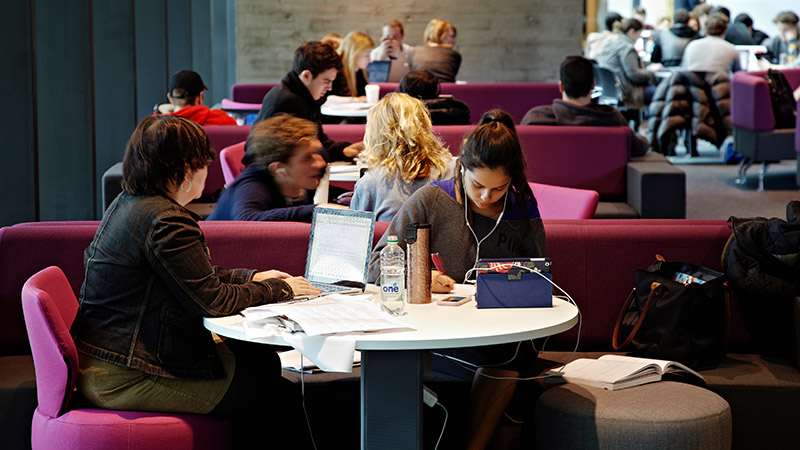UCAS code: N2F8
Start dates: September 2024 / September 2025
Full time: 3 years, or 4 if a work placement is chosen
Part time: up to 8 years
Location: Headington
Department(s): Oxford Brookes Business School, School of Law and Social Sciences
Overview
Oxford Brookes was one of the first universities to embed responsible management in our business courses. Combining your study with geography, you’ll prepare to become a change maker, whether that’s within an organisation or working with businesses to help them make a difference.
We'll challenge you to make connections between environmental risks and business activity. In business modules, you’ll look at business problems and responsibilities through a sustainability lens. At the same time, you’ll explore the geographic and social impact of climate change.
From field trips to a placement year, you won’t be short of opportunities to boost your employability. You’ll find our graduates in a range of roles at multinational businesses, charities, governments, and more.

Why Oxford Brookes University?
-
Responsible leaders
We’re signed up to the UN’s Principles for Responsible Management Education so you can be confident you will learn business the right way.
-
Experience business
Across the course you will interact with different businesses and business leaders. You'll have the opportunity to go on work placement with the likes of BMW or IBM.
-
Multidisciplinary approach
Gain an understanding of both business management and geography, drawing on expertise from both the Business School and the School of Law and Social Sciences.
-
Sustainability focus
While many geography degrees have a sustainability focus, it’s not as common for business courses to cover it to the level we do.
-
Hands on field trips
Take part in practical work in your first year and a residential trip (typically overseas) in your second year.
-
Free language courses
Free language courses are available to full-time undergraduate and postgraduate students on many of our courses, and can be taken as a credit on some courses.
Course details
Study modules
Teaching for this course takes place Face to Face and you can expect around eight hours of contact time per week. In addition to this, you should also anticipate a workload of 1,200 hours per year. Teaching usually takes place Monday to Friday, between 9.00am and 6.00pm.Contact hours involve activities such as lectures, seminars, practicals, assessments, and academic advising sessions. These hours differ by year of study and typically increase significantly during placements or other types of work-based learning.
Please note: As our courses are reviewed regularly as part of our quality assurance framework, the modules you can choose from may vary from those shown here. The structure of the course may also mean some modules are not available to you.
Careers
Our graduates go in a range of different directions. You might apply your skills to roles in:
- environmental management
- conservation
- leisure and tourism
- consultancy
- geography teaching.
Student profiles
Related courses
Entry requirements
Wherever possible we make our conditional offers using the UCAS Tariff. The combination of A-level grades listed here would be just one way of achieving the UCAS Tariff points for this course.
Standard offer
UCAS Tariff Points: 112
A Level: BBC
IB Points: 30
BTEC: DMM
Contextual offer
UCAS Tariff Points: 88
A Level: CCD
IB Points: 27
BTEC: MMM
Further offer details
Applications are also welcomed for consideration from applicants with European qualifications, international qualifications or recognised foundation courses. For advice on eligibility please contact Admissions: admissions@brookes.ac.uk
If you don’t achieve the required tariff points you can apply to join a foundation course, like Foundation in Business or an international foundation course to help to reach the required level for entry onto this degree.
Specific entry requirements
Please also see the University's general entry requirements.
English language requirements
Please see the University's standard English language requirements.
English requirements for visas
If you need a student visa to enter the UK you will need to meet the UK Visas and Immigration minimum language requirements as well as the University's requirements. Find out more about English language requirements.
Credit transfer
Many of our courses consider applications for entry part-way through the course for students who have credit from previous learning or relevant professional experience.
Find out more about transferring to Brookes. If you'd like to talk through your options, please contact our Admissions team.
Terms and Conditions of Enrolment
When you accept our offer, you agree to the Terms and Conditions of Enrolment. You should therefore read those conditions before accepting the offer.
International qualifications and equivalences
How to apply
Application process
Full time international applicants can also apply through UCAS
Tuition fees
Questions about fees?
Contact Student Finance on:
Tuition fees
Please note, tuition fees for Home students may increase in subsequent years both for new and continuing students in line with an inflationary amount determined by government. Oxford Brookes University intends to maintain its fees for new and returning Home students at the maximum permitted level.
Tuition fees for International students may increase in subsequent years both for new and continuing students.
The following factors will be taken into account by the University when it is setting the annual fees: inflationary measures such as the retail price indices, projected increases in University costs, changes in the level of funding received from Government sources, admissions statistics and access considerations including the availability of student support.
How and when to pay
Tuition fee instalments for the semester are due by the Monday of week 1 of each semester. Students are not liable for full fees for that semester if they leave before week 4. If the leaving date is after week 4, full fees for the semester are payable.
- For information on payment methods please see our Make a Payment page.
- For information about refunds please visit our Refund policy page
Additional costs
Please be aware that some courses will involve some additional costs that are not covered by your fees. Specific additional costs for this course are detailed below.
Compulsory costs
| Additional costs | Amount (£) |
|---|---|
You'll participate in compulsory field trips in your first and second years. All travel and accommodation costs for these trips are covered by the university. You are responsible for your living costs while on field trips. |
£0 |
| You will need to have sensible footwear and a weatherproof jacket for field trips. | £0 |
Optional costs
| Additional costs | Amount (£) |
|---|---|
If you choose to participate in any additional, optional trips, you are responsible for any associated costs. |
£10-150 |
It’s your responsibility to cover print / binding costs where coursework submission is required. Please note that a lot of the coursework is now submitted online. |
From £30 |
| You may choose to purchase books to support your studies. Many books on our reading lists are available via the Library, or can be purchased secondhand. | £20-60 per book |
Accommodation fees in Brookes Letting (most do not include bills) |
£94-265 per week |
Accommodation fees in university halls (bills included, excluding laundry costs) |
£122-180 per week |
Graduation costs include tickets, gowning and photography. Gowns are not compulsory but typically students do hire robes, starting at £41. |
Typically £0-200 |
Students are responsible for their own travel to and from university for classes. BrookesBus travel is subsidised for full-time undergraduate students that are on a course with a fee of £9,250 or more, or living in an Oxford Brookes hall of residence. There is an administration fee for the production of a BrookesKey. |
From £10 |
Funding your studies
Financial support and scholarships
Featured funding opportunities available for this course.
All financial support and scholarships
Information from Discover Uni
Full-time study
Part-time study
Programme changes:
On rare occasions we may need to make changes to our course programmes after they have been
published on the website. For more information, please visit our
changes to programmes page.

